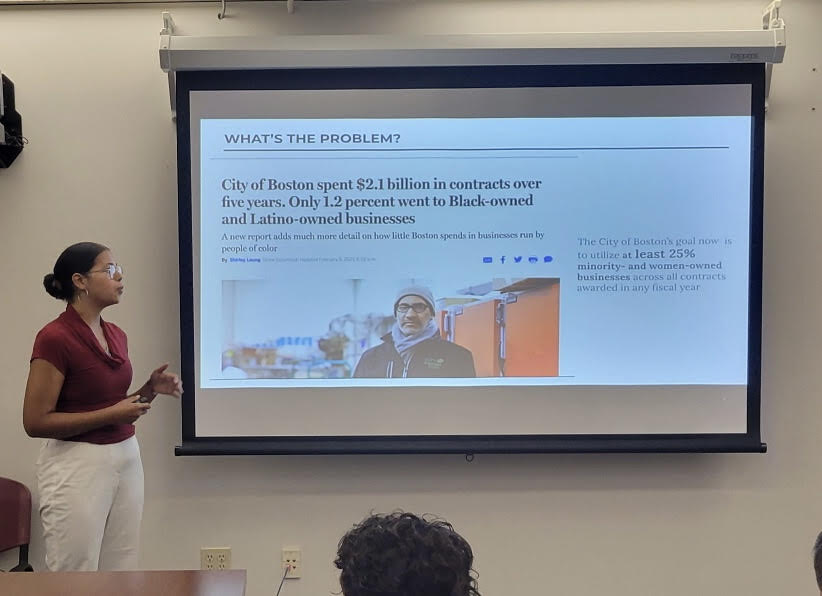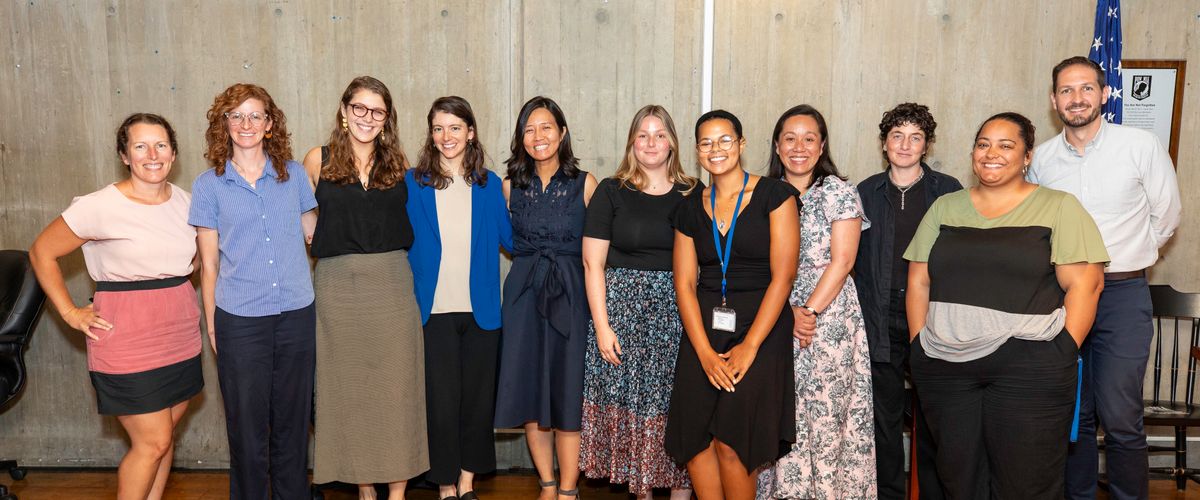Amie Thomas (GRS’24) was the 2024 Mayor’s Office of New Urban Mechanics Summer Fellow.
Interested in this fellowship? Click here to learn more about our summer internship & fellowship offerings.
Like many forward-thinking students, come the end of the fall semester, I needed to decide on what my plans for the summer would be. With one semester of my Statistical Practice master’s program completed, I was eager to apply my skills in a way that aligned with my passion for community improvement. After reviewing numerous job postings looking for statisticians in finance and biotech, I stumbled upon a unique opportunity shared by my professor, Masanoa Yajima. It was a BU Initiative on Cities fellowship with the Mayor’s Office of New Urban Mechanics (MONUM)—one of the many City Hall acronyms I would learn. From my research, I learned that the New Urban Mechanics fellowship was created to attract leaders to public service through civic research and design to demonstrate that Boston is a place where the community can drive positive change. The team values innovative ideas from individuals of all backgrounds. I was sure that included a statistician like me. It was clear: I had found my summer plan.
It’d be dishonest to say I wasn’t intimidated by the interview process. This was particularly true for the two-hour group interview, where I had to give a brief presentation on the intersection of two of my interests. However, as I navigated through it, I reminded myself I had the passion, skills, and experience that suited the position. The only real barrier was my self-doubt. Adopting this mindset ultimately helped me secure the position, and I’m proud of overcoming that challenge. After accepting the offer to join the MONUM team, I eagerly looked forward to what the summer would bring.
On the first day of the fellowship, I met my fellow cohort members, the full-time MONUM team, and the two new directors of MONUM. They introduced a new direction for MONUM that differed somewhat from what I had learned during my research. This updated direction included two projects for the 8-week fellowship: the traditional design project aimed at prototyping solutions to simplify civic life, and the second a research project designed to assist departments in answering key research questions to guide policy and decision-making.
My design project involved working with the Procurement Services team, a newer team within city hall responsible for securing high-quality services at the best value for all departments. I was tasked with creating a toolkit to help both city hall departments and the Procurement Services team enhance their advertisement and outreach strategies to attract a more diverse range of small, local, minority, and women-owned businesses for city contracts: formally, these are Requests for Proposals.
For my research project, a group effort, two other fellows and I collaborated with the Mayor’s Office of Housing (MOH) to demystify the costs associated with housing development in Boston. As you might imagine, these were not trivial tasks. Although I had little knowledge of housing development or Requests for Proposals, I was eager to learn and rise to the challenge. With the project scope in hand, I began immersing myself in the problem, meeting with project sponsors and key stakeholders, and developing a strategic plan.
Over the course of the eight weeks, we were offered a few professional development opportunities. During our chief chats, we had the chance to engage with the chiefs of various departments, gaining insights into their visions and activities within their departments. My favorite professional development opportunity was the walking tours, which provided an immersive experience. These tours allowed us to directly observe and understand the tangible outcomes of the work in city hall, enriching our perspective on the impact of municipal projects

Design project lightning talk
As the fellowship neared its conclusion, we presented our final deliverables to the project stakeholders and provided a summary presentation to various city hall members. Here is an overview of the work I completed for both projects:
For my design project, I investigated how companies engage with their consumers and how various city departments communicate their activities to the community. Obtaining direct feedback on user experiences was far more effective than making assumptions about vendor preferences. I designed and deployed a survey that received a 22% response rate to gather this feedback. Based on my research and survey findings, I modeled and proposed a redesign of the City Records newsletter to improve the advertisement of city contracts and other essential information. Additionally, I recommended the Procurement Services team create video tutorials to clarify the proposal process, send out direct mail cards to inform vendors of significant changes, and ways the team could provide opportunities for vendors to connect and share information within their community. I also suggested ongoing engagement with vendors through surveys to collect feedback on their experiences, demonstrating that the city values their input and is dedicated to improvement.
The research project involved conducting literature reviews to familiarize myself with housing development and analyzing data on past housing developments in Boston. The team also interviewed professionals in the developer community to gain a clearer understanding of challenges and potential improvements for the city’s housing initiatives. The outcome of our research was a comprehensive report on our findings. We presented a detailed data analysis, including the costs associated with housing development. Additionally, we proposed the developer community come together to discuss these issues collectively. This approach aimed to address the widespread confusion and shared challenges within the community, fostering a more unified strategy for improving housing development in Boston.
Before this fellowship, I had little understanding of what it took to effect change in my city or the steps required to address the everyday issues faced by community members. However, my time at city hall helped me see what it takes to do so. I learned the most effective way to address community problems is to actively involve the community affected by them, as their insights and experiences are invaluable. I now know that while change can be swift when dedicated individuals are in charge, it often requires patience due to numerous moving parts and bureaucratic obstacles that must be overcome. I also experienced what it was like to take responsibility for a project and make it my own. My work can profoundly impact, influence real change, and improve lives. I learned it’s important to acknowledge that not having all the answers is perfectly acceptable—no one expects perfection. Asking questions is crucial, as it can uncover information gaps or clarify uncertainties others might wonder about. Lastly, I learned how to embrace the unknown with confidence, appreciate the opportunity to learn and grow and know that you will acquire the necessary knowledge along the way. Thank you to the IOC, the MONUM team, my MONUM fellows, and everyone who made my summer one of professional and personal success and growth.

